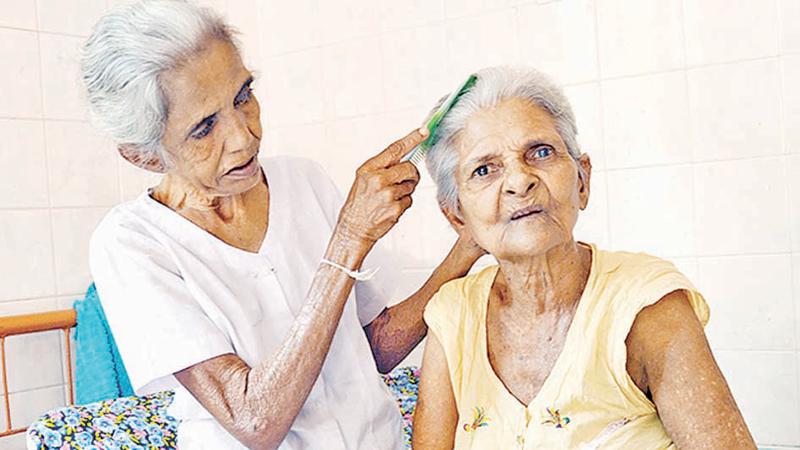
Elizabeth Rosa remembers how Christmas used to be when her husband was still alive. The couple was living in Negombo. The suburban area they resided came into life during the festive season. On Christmas day, the couple went to church, shared a hearty lunch with relatives and had a fine time.
All of this changed since her husband died 15 years ago. Now in her early seventies, Rosa is living in an elders’ house in Battaramulla with 15 others. With no children of her own, Rosa was at the mercy of her relatives before she came to the Home.
“We have lived so long and there is only little longer to go. There’s nothing much we can do about it,” she said as she sat on a wooden chair next to her room at the elder’s home. A friend, another elderly lady, was reading a newspaper at the far end of the verandah.
Sri Lanka is a country with a large population of elders (aged 60 and above) in Asia.
According to statistics by the National Secretariat for Elders (NSE), elders made up to 13.9 percent of the total population of the country in 2015, in 2025 the number is expected to rise to 18.8 percent and in 2040 up to 25.4 percent making them one fourth of the population.
 “This is a serious issue,” Chairman of the NSE Saman Udawatte said.
“This is a serious issue,” Chairman of the NSE Saman Udawatte said.
The NSE is the country’s prime administrative body for elders that is implementing programs approved by the Council for Elders.
Udawatte said if the issue is left unresolved, it could end in a crisis as the young will have to fight against all odds to fend for the increasing aging population. The solution he says is to put in place carefully evaluated programs.
“Elders are a reserve of gold. They are the ones who aided in creating this economy, but after 60, their expertise is not harnessed,” Udawatte said.
Only about one percent of the elders are pensioners, and out of the total population of elders (about three million) only 25.3 percent are actively involved in economic developmental activities.
The NSE chairman said that most of the elders are interested in getting involved in such activities, but the country lacked a mechanism to absorb them.
Gerald Siribaddana, 79, is also living in the same elders’ home Rosa takes refuge in. After spending most of his life as a marine engineer, voyaging from country to country, he has a lot of stories to relate and experiences to share. His children visit him and grandchildren speak to him on daily basis.
“We are a written off crowd. The situation for elders is not good yet,” Siribaddana said.
“There is the growing number of elderly widows who are “less economically active, have no access to a formal social security system, have high vulnerability for health issues, including mental disorders, and having no ownership of economic and social assets,” a report by the NSE stated.
According to statistics by the Department of Census and Statistics, over 80 percent of elderly persons living without a spouse are women. Most of these widows, nearly 90 percent, are between 60 and 64 years of age.
 Rosa, a widow, said she falls sick often. Just last week she was admitted to the hospital. She finds herself wanting to rest, and when she doesn’t she reads newspapers. The home buys four newspapers every morning.
Rosa, a widow, said she falls sick often. Just last week she was admitted to the hospital. She finds herself wanting to rest, and when she doesn’t she reads newspapers. The home buys four newspapers every morning.
Meanwhile, the officer in-charge of the Home, where Rosa and Siribaddana stay in, H. G. P. de Silva said more and more elders are left in elders’ homes because younger generations are moving away from cultural values.
“Elders’ homes were to be seen only in urban areas before, but now they are expanding to villages too,” Silva said.
He said some of these establishments are simply built as a business and not in good faith to take care of elders. The NSE has raided such homes where elders are left in dark and damp rooms, at times with crawling worms.
According to government statistics, there are 306 elders’ homes in the country, of which six are maintained by the State. Nearly 8,000 elders are residing in these homes.
The government, through the Treasury, provides an allowance of Rs. 2,000 to elders over 70 years of age per month. Since 2016, a deduction of Rs. 100 from the allowance is made to maintain a Social Security Fund. The NSE was able to put in place several programs for elders.
“We have to increase self-employment prospects for elders. This will help them to be independent for as long as they have the strength,” Udawatte said.
The other timely solution, he said, is to create awareness among school students about respecting elders.
“Yes, we have come to that. I believe the school syllabus has to have a section where the students are taught about elders,” he said.
